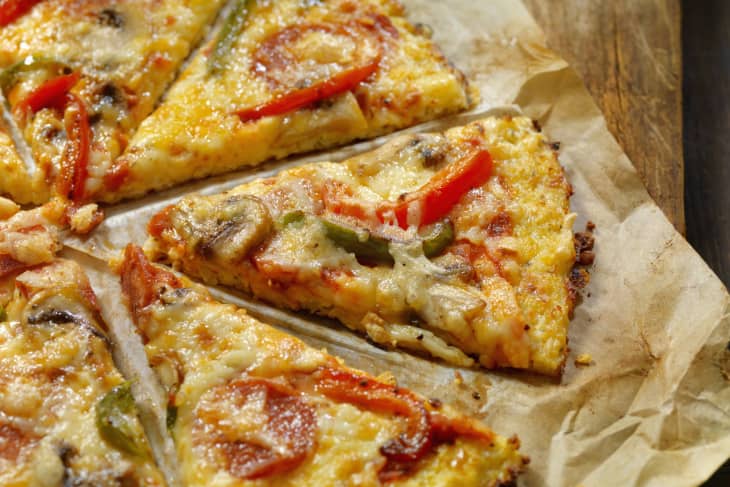Sorry but Cauliflower Pizza Crusts Might Not Be That Healthy
Remember a few years ago, when your Paleo-eating, Crossfit-obsessed friends invited you over for cauliflower crust pizza? And as you forced a smile through one damp, flavorless mouthful after another, you thought this will never catch on.
Um, yeah, it seems to have actually caught on. Trader Joe’s and Costco both sell their own cauli-crusts, California Pizza Kitchen has made it a permanent menu addition, and even my fave local pizza joint offers it as a semi-regular special.
I’ll go ahead and admit that I would rather put marinara sauce on my shoelaces and eat that than eat cauliflower crust pizza. Fortunately, my opinion doesn’t really matter, and cauliflower crust remains an increasingly popular vegan, gluten-free, and low-carb option.
But is it really a better choice than “regular” pizza? Is it really the low-cal, low-carb option people believe it is? The answer lies in the nutritional labels.
Cauliflower Crusts Isn’t Always the Low-Cal, Low-Carb Solution It’s Cracked Up to Be
First, not all cauliflower crusts are the same, and not all of them are truly low-carb or low-cal. Although an entire Cauli’flour Foods’ original Italian crust — which is made from cauliflower, mozzarella, eggs, and spices — has just 13.5 grams of fat and 6 grams of carbs, the amount of egg and cheese used in other brands or in some homemade crusts means you can eat a significant amount of fat, even before you add a single slice of pepperoni.
What about frozen pizzas? Trader Joe’s specifically says that it skips the extra cheese and egg in favor of cornstarch, potato starch, olive oil, and sea salt, which does cut out all the added fat, but it also means that each serving has 17 grams of carbs. (Compare that to a bigger slice of TJ’s sprouted whole-grain pizza crust, which has 24 grams of carbohydrates).
According to PopSugar, each serving of Costco’s roasted vegetable cauliflower pizza has 230 calories, 8 grams of fat, and 27 grams of carbs. If you cut Caulipower’s veggie pizza into four pieces (purely to make the serving sizes more comparable), each slice will have 155 calories, 7 grams of fat, and 18 grams of carbs.
Meanwhile, California Pizza Kitchen’s crust goes the mozzarella cheese and rice flour route, so one slice clocks in at 90 calories and 14 grams of carbs. (A slice of CPK’s traditional hand-tossed crust is 97 calories and 21 grams of carbs.)
Why It’s Important to Read the Labels
If you’re not making your cauli-crust at home, it’s always worth reading the ingredient lists carefully before buying one. They’re not always dairy-free, they’re not always low-fat and, in some cases, they might not be any “healthier” (make a set of finger quotes when you read that) than a traditional thin-crust or hand-tossed pie.
What do you think of cauliflower pizza crusts? Let us know in the comments.
